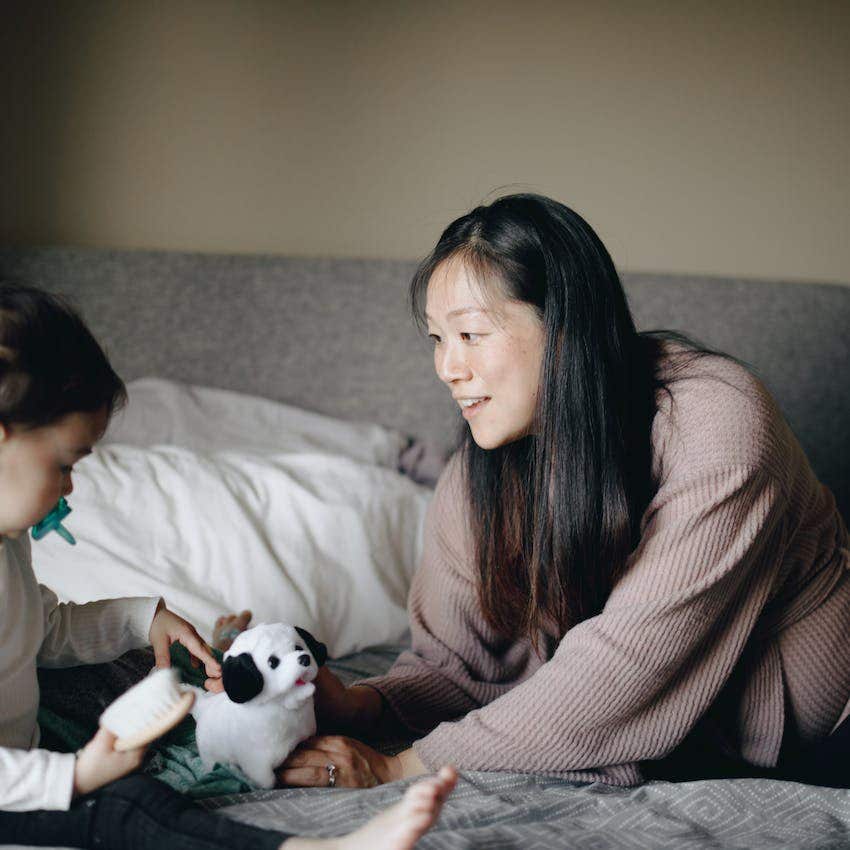A Child Therapist Reveals The Simple Thing Her Parents Did That Boosted Her Confidence
Set your child up to love and care for themselves when you're not around.
 Agung Pandit Wiguna / Pexels
Agung Pandit Wiguna / Pexels Almost half of American children will experience childhood trauma from their parents, and almost all of those children will deal subsequent issues to their health and well-being into adulthood.
The nature of childhood trauma is rooted in many different areas, but one of significance centers around empathy. How does a parent ensure their child feels understood and loved?
A child therapist revealed a simple trick to boost kids’ confidence with a stuffed animals.
Child psychologist Jess VanderWier shared on TikTok the unique way her parents encouraged her confidence and sense of acceptance: They talked to her stuffed animals about her.
Whether it was getting tucked in for bed at night or waking up for school in the morning, her parents told her stuffed animals all about the good that she was doing in her life. Asking them to hold her tightly while she was sleeping or telling them about how awesome she was for getting a good grade, the positive conversations between her parents and her stuffies were always a joy for her to listen to.
 Photo: PNW Production / Pexels
Photo: PNW Production / Pexels
Speaking positively about children to their stuffed animals can help them build confidence and self-esteem.
Asking her stuffed animals to watch over her or telling them all about her beautiful smile, her parents were using a tactic that allowed her to build confidence early in her childhood. “As a child, I would sit there and smile as I overheard my parents saying good things about me,” VanderWier explained, “by overhearing them share good things about me, I started to believe those things were true.”
Studies show that in addition to helping bolster confidence, stuffed animals can also help children develop important social skills. Along with acting as a comforting force during stress, stuffed animals can help children to develop language and emotional skills during playtime.
Even for parents with older children, a 2016 study found that using a stuffed animal for comfort greatly influenced college students in a positive way — whether used in group therapy, at home, or in times of crisis.
Knowing that older children, and even adults, can benefit from healthy strategies involving stuffed animals, how necessary is it to introduce them into a child’s life? And at what age?
Kids as young as five can establish a negative sense of self-worth.
Healthy parenting approaches and strategies to help build confidence in children early is imperative for their long term self-esteem and overall self-worth.
Self-esteem remains relatively stable across one’s lifespan. That means, negatively impacting a child’s self-worth in early childhood can damage their confidence well into adulthood.
The same A 2016 study about childhood self-esteem revealed that children as young as five can begin to develop confidence issues and practice negative self-talk.
Implementing small acts and strategies, like nightly chats with stuffed animals, can make a lasting impact. These routines might seem insignificant, but they often have more impact than a larger display of affection.
 Photo: Anna Shvets / Pexels
Photo: Anna Shvets / Pexels
Confidence in children can manifest in many ways, including misbehavior and defiance.
While many parents are quick to discipline at any sight of misbehavior in their children, it’s important to recognize the positive side of acting out.
According to Christina Furnival, a child and family counselor, misbehavior in children can actually be a sign of confidence. In addition, independence and wanting to complete tasks alone, not always listening to their parents, and going off to school “without looking back” can all be signs of a confident child.
Oftentimes, allowing kids to make mistakes and misbehave in some scenarios can help to bolster their confidence outside the home. So, instead of immediately condemning the actions of your seven year old who wants to load the dishwasher his way, think about the long-term benefits of wasting some space for one load.
Outside of conversations with stuffed animals, parents can use other empathetic approaches to boost their children’s confidence.
Family Life Educator Sheri Jonas shared a strategy for parents to use as early as when their children begin to talk: positive affirmations.
Writing affirmations on a child’s mirror like "I am enough" or "I am beautiful" can provide a reminder for them to speak warmly about themselves. Whenever possible, parents can play a role in walking through the positive affirmations by repeating positive words that help children to believe in both their and their parent’s worth.
Providing a safe space for children to experiment socially, creatively, and intellectually is another great confidence development tool. Whether that’s having access to creative materials for a new hobby or encouraging your child to branch out of their comfort zone — they can all instill healthy mindsets for kids.
So, while you endure the intense shift to modern parenting, remember that these new strategies and mindsets are a good thing.
Implementing more kindness, empathy, and self-esteem boosting practices can help set your child up to love and care for themselves when you’re not around.
Zayda Slabbekoorn is a news and entertainment writer at YourTango focusing on pop culture analysis and human interest stories.
